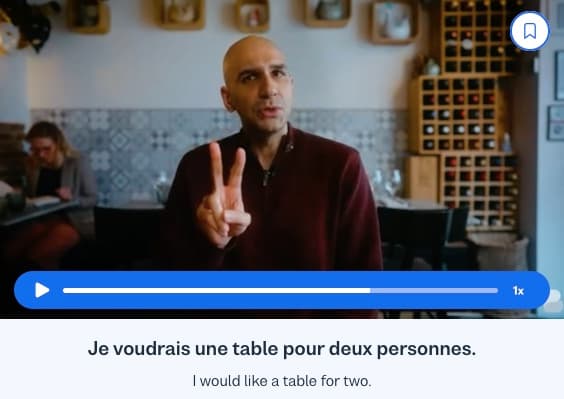I want to learn...
If you are wondering how you can express your wishes or opinions better in French, then learning the conditional tense in French would be very helpful for you!
This guide is designed to help you understand and master the French conditional tenses (the present and past), which can help you elevate your French language skills. Many learners feel limited by their grammar knowledge, and this article will explain how you can express your wishes and desires more clearly, give some helpful advice, or point out your opinions with conviction like a native speaker in French.
Let's get started and explore how to use the French conditional tenses in various contexts!
When to use the French conditional
You can use the conditionnel présent when you want to:
1. Express your wishes and desires in a courteous way.
Example: Un jour, je voudrais devenir astronaut. (One day, I would like to become an astronaut.)
2. Ask for something politely.
Example: Je voudrais de l'eau s'il vous plaît. (I would like water please.)
3. Offer some advice with modal verbs like pouvoir (can) and devoir (must).
Example: Tu pourrais apprendre le français si tu veux visiter la France, un jour.
(You could learn French if you want to visit France one day)
4. Express a hypothesis.
Example: Si je pouvais aller sur la Lune, je verrais la Terre. (If I could go to the moon, I would see the Earth.)
5. Express a conditional sentence.
Example: S’il pleut, je porterai un manteau. (If it rains, I will bring a coat.)
Learning the conditionnel présent can really make a difference and expand your ability to have meaningful conversations in French.
Mastering this will allow you to sound more considerate and polite, which is especially useful when traveling or speaking with someone you don’t know very well. Plus, you will be able to express more complex ideas! But how do we form this tense?
Building blocks: How to conjugate the conditionnel présent
Conjugating the conditionnel présent is simple. The conditional conjugation builds on the conjugation of other tenses you have already learned like l’imparfait.
Here is a simple step equation for you to remember: conditionnel présent = infinitive form + same endings as l'imparfait
Let’s see what this looks like for the verb, manger (to eat), conjugated in the conditional in the table below:
French conditional tense conjugation
| Personal Pronoun | Present | L’imparfait | Le conditionnel | Usage in a sentence |
|---|---|---|---|---|
| Je | mange | +ais | mangerais | Je mangerais (I would eat) |
| Tu | manges | +ais | mangerais | Tu mangerais (You would eat (informal, singular) |
| Il / Elle | mange | +ait | mangerait | Il mangerait (He/she would eat) |
| Nous | mangions | +ions | mangerions | Nous mangerions (We would eat) |
| Vous | mangiez | +iez | mangeriez | Vous mangeriez (You would eat (formal, plural) |
| Ils / Elles | mangent | +aient | mangeraient | Ils / Elles mangeraient (They would eat) |
Hypothetical situations in French
Remember when I told you the conditionnel présent can be used in many different situations? Well, here’s another one! You can also select this tense when you want to talk about a hypothetical situation or state. In other words, use the conditional when you want to say what “would” or “could” happen if something else happened or were true.
Let’s take a look at an example in English to help clarify what a hypothetical situation might be. “If I knew how to speak French, I would live in Québec.” Using the conditional, that sentence would look like this in French: Si je savais parler français, je vivrais au Québec.
This might seem tricky, but the good news is these hypothetical situations most often follow the same structure (you can as well and as often see the structure "conditionnel present, si + imparfait")
Refer to the table below:
Hypothetical events and the French conditional tenses
| Si | L’imparfait | Le conditionnel présent |
|---|---|---|
| Si (If | je savais parler français, I knew how to speak French, | je vivrais au Québec. I would live in Québec). |
| S’ (If | il ne pleuvait pas, it weren’t raining, | nous pourrions courir dehors. we could run outside). |
Conditional mood structure variant
| Le conditionnel présent | Si | L’imparfait |
|---|---|---|
| Je serais content (I would be happy | si if | tu venais me voir. you came to see me) |
Irregular verbs and their stems
Of course, no French grammar lesson is complete without the mention of irregular verbs! The good news is that both regular and irregular verbs use the same endings, it’s just that the irregular verbs require an irregular stem.
Fear not, intrepid learner of French! There are some good news about these irregular verbs that will make conjugating them a piece of gâteau, er…cake:
Irregular stems in the conditional are the same ones used in the futur simple, and you’re already a pro at that tense.
The endings that you add to the irregular verb stems are exactly the same as the ones you add to regular verbs. Phew, this means you only have to memorize one set of endings no matter if the verb is regular or irregular.
Here is a list of 8 commonly used irregular verbs and their stems used in the conditionnel présent:
8 Commonly used irregular verbs and their stems
| avoir - au |
|---|
| être - ser |
| faire - fer |
| aller - ir |
| venir - viendr |
| vouloir - voud |
| devoir - devr |
| pouvoir - pourr |
Start using the French conditional
Now, get out there and start using the conditionnel présent when you want to. And this could be in a lot of situations!
Like if you are dining in a restaurant, you can say:
Pourriez-vous me passer le sel, s’il vous plaît ? (Could you please pass me the salt?)
Or you pass by a boulangerie (bakery) and you crave for a buttery croissant, you can ask:
Je voudrais un croissant, s’il vous plaît. (I’d like a croissant, please).
And if you want to go to France (plus other French-speaking countries) and learn French:
Vous pourriez apprendre le français avec Busuu ! (You could learn French with Busuu!)
Newlanguages


